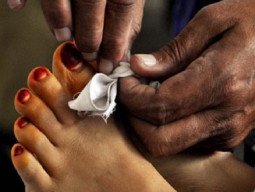
For employed people facing the same 9 to 5 grind every day, work life appears to enter an inescapable monotony however, the same tedium would be a sigh of relief for the overworked and underpaid door-to-door saleswomen in Karachi, who never know what the next knock at a door would bring; a cold glance from a potential customer or a harassing wink from her lewd husband.
For instance, imagine the life of Hira, a saleswoman who has been selling make-up products and children's play toys from door-to-door since the past two years. Hira wakes up early every morning to prepare breakfast for her children and husband before she rushes to work, where either a watchman restricts her entry into an apartment building, a lecherous resident makes inappropriate advances towards her, or an agitated customer takes offence at her knocking on her door.
“After a day of toiling here and there, once I return home by 5pm after travelling in an overcrowded bus, I have to diligently prepare dinner for the family or otherwise face the taunts hurled at me by my in-laws. My life is nothing short of living hell,” shared Hira, who believed that saleswomen like her received pay way below the monthly income fixed by the government.
Similarly, Samina Nadeem, a mother of four, cushions her limited household finances by selling feminine hygiene products at apartment buildings located at the Burns Road. Samina, whose husband works as a car mechanic, begins her day at 8am and after toiling tirelessly from door-to-door carrying heavy bags all through the day she finally returns home by 6pm.
“Earlier I used to work for a contractor, who would give us a sales target to meet every day. For every Rs1000 worth of products we would sell, we earned a commission of Rs100 rupees. I would work six days a week and received no pay on my day-off. Since I received a small percentage of my earnings from the contractor, I decided to take a loan of Rs50,000 and started selling items on my own,” said Samina.
Unlike Samina, who is fairly new to the profession, Parveen Farooqi, has been selling women’s traditional suits from door-to-door since the past 30 years. Agreeing with Samina, Parveen also felt that the biggest drawback of her profession was the interference of the contractor, who only gave her a small commission.
“Apart from the temporary nature of the job, another hurdle is that the society in general looks down upon saleswomen who go around knocking at people’s doors. Some people point fingers at our character while others subject us to harassment. But we are still forced to do this work due to our financial problems,” shrugged Parveen, who further highlighted the fact that saleswomen were not registered with any labour organisation.
According to Dr Alia Ali Bilgrami, Associate Professor of Women’s Studies at the University of Karachi, saleswomen selling items door to door continue to work amidst unfavourable working conditions in order to feed their families. “Such women usually work for a third party contractor and either receive no salary or only make Rs10,000 to Rs12,000 per month apart from the commission,” elucidated Dr Bilgrami.
“Women who sell items from door to door are not counted as regular workers. However, since their job involves convincing customers to buy their products, it is akin to marketing and the government should register them in the Sindh Employees Social Security Institution (SESSI),” opined Zahra Khan, leader of the Khatun Mazdoor Union.
Shamim Mumtaz, leader of the Pakistan People’s Party (PPP), maintained that the ruling party of Sindh was taking steps to register saleswomen in a specific category of workers. Meanwhile, officials from the Labour Department Sindh also claimed that saleswomen will be issued labour cards through NADRA soon.


























1683888120-0/image-(3)1683888120-0-270x192.webp)
1715752665-0/hazimpraise-(1)1715752665-0-270x192.webp)







COMMENTS
Comments are moderated and generally will be posted if they are on-topic and not abusive.
For more information, please see our Comments FAQ